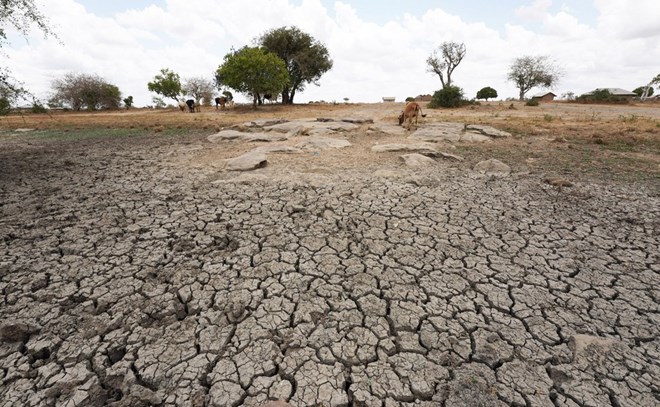
Wednesday February 22, 2023

The file photo shows a herd of livestock seen in a dry field in the Kidemu sub-location in Kilifi county, Kenya, on March 23, 2022. (Xinhua/Dong Jianghui)
NAIROBI, Feb. 22 (Xinhua) -- The realization of social justice and cohesion in Africa could be a mirage as the unfolding climate crisis tears communities apart besides worsening poverty and inequality, a campaigner said on Monday during World Day of Social Justice.
Rosalid Nkirote, the executive director of the Nairobi-based African Coalition of Communities Responsive to Climate Change, said extreme weather events linked to global warming have diminished fairness, justice, and egalitarianism in the continent.
"Climate change alone is wreaking havoc on the African Union's Agenda 2063, which among others aims at improving real per-capita incomes, reducing incidences of hunger, especially among women and youth, and creating job opportunities," Nkirote said in a statement issued in Nairobi, the Kenyan capital.Marked every Feb. 20, this year's World Day of Social Justice seeks to rally communities toward collective action on threats to basic rights and human dignity, including poverty and hunger.
Nkirote noted that climate change, along with COVID-19-related disruptions, conflicts, and the global economic downturn, has worsened the fragility of Africa's poor, denying them basic items like food, clean water, shelter, and health.
In addition, Nkirote said climate emergencies have overwhelmed public coffers in the continent, pushing the rural and urban poor on the margins of survival and denying them a future of hope and dignity.
She cited the escalating drought in the East and Horn of Africa as reversing gains made in realizing social justice for all, given the magnitude of forced displacement, resource-based conflicts, and hunger.
Statistics from the Intergovernmental Authority on Development (IGAD) indicate that 23.4 million people in Kenya, Somalia and Ethiopia are grappling with acute food insecurity linked to a prolonged and climate-induced drought cycle.
Nkirote noted that as the climate crisis undermines efforts to bridge the access gap on basic services like clean water, electricity, and modern sanitation in Africa, social justice remains a pipedream.
She emphasized that a people-centered climate response will be key to achieving social justice and inclusivity in a continent that contributes least to planetary warming but has borne the brunt of this phenomenon.